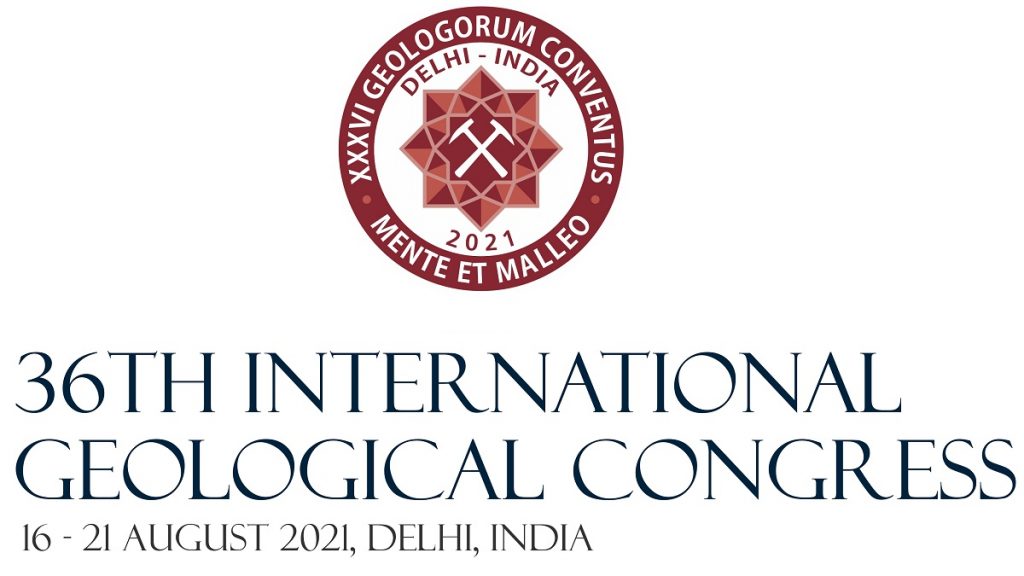Talks by Renowned Geoscientists Mark Second Day of International Geological Congress, Delhi

The reformatted 36th International Geological Congress is being organized jointly by the Ministry of Mines, Ministry of Earth Sciences, Govt. of India and Indian National Science Academy from 20-22nd March 2022 on virtual platform with the support of India’s neighboring countries- Bangladesh, Nepal and Sri Lanka.
Described as the Olympics of Geosciences, the IGC’s are held quadrennial, under the aegis of the International Union of Geological Congress (IUGS), the scientific sponsor of IGCs. The Congress was attended virtually by the geoscience community over the world with its inaugural ceremony in a hybrid mode.
The Inaugural function of 36th IGC was followed by a Panel discussion. The theme for the session was “Geoscience for the next decade: Challenges and Society”.
The technical session was chaired by Prof. Ashok Singhvi: DST-SERB Year of Science Professor, PRL Ahmedabad.
The scientific program reflected on how Geosciences are integrally related to a sustainable future, touching various aspects of life. The talks highlighted the Complex interactions of various phenomena that regulate the earth processes and their symbiosis with the biosphere, by focusing on emerging paradigm in the realm of Geosciences in the context of sustainable development.
The technical session covered various emerging topics of discussion viz., Major Challenges before the Geoscientists, UNESCO and IGCP’s contribution to geoscientific community to deliver UN 2030 agenda and UN Sustainable Development Goals, African Mineral Industry, Geoethics in mining, On the Future (and Past) of Stratigraphy, Role of Geomagnetism Studies in coming Decades, Developing Earthquake & Tsunami Resilient Society, The Art of Geoscience Communication and its importance, Using Geological thinking to sustain in Humanly Habitable Earth, Society and Geosciences, Science Policy.
The Panel discussion was all about Understanding the dynamics of the earth to create a safe and healthy planet, driving sustainable growth, reducing the gender inequalities in the field of earth sciences, better understanding of the geosciences, prediction and mitigation of climate changes and geohazards.
The discussion marks that focus of geoscientific community must be on understanding the modelling of Earth Processes where IUGS may is playing a major role.
The second day of the technical session was chaired by Prof. Om Narain Bhargava: Honorary Professor, Panjab University, Chandigarh; Former Director, Geological Survey of India and Prof. Pradeep Srivastava; Department of Earth Sciences, Professor, Indian Institute of Technology, Roorkee, India.
The talks were delivered by the renowned Geoscientists of the world covering various topics viz., Data driven Earth Science Learning and Discovery, From Hadean Earth to a Habitable Planet, The Anthropocene as a potential unit of the geological time scale: an update on Progress and High-Pressure Record of a Cretaceous Salinity Crisis.
The Deep Time Digital Earth is the first IUGS- recognized big science program. Deep time data are data related to the changing processes that the earth has experienced through the millions of years of geological time. Through DDE data insights into the distribution and value of Earth resources and materials will be made available.
The talk delivered by Prof. M. Santosh highlighted on the evolution of the planet Earth from Hadean to its present form. It focused on the composition of Upper Crust, the thickness of mafic KREEP Basalt in the Lower Crust and generation of primodial continents with Komatiite from the solidification of the dry magma ocean at 4.6 Ga.
The talk delivered by Prof. Jan Zalasiewicz brought out the fact that the Anthropocene Earth System shows profound departure from Holocene baseline conditions and the changes are now irreversible. Geologically, the Anthropocene is sharply distinct as expressed through a wide array of stratigraphic proxies.
The talk ended with lecture from Prof. Roland Oberhaensli, Former President IUGS, Professor, University of Postdam, Germany on “High Pressure Record of a Cretaceous Salinity Crisis.”
*******
Also See:
- President of India to confer Padma Vibhushan, Padma Bhushan and Padma Shri Awards
- Governor presides over felicitation function organized by Kangra Against Covid-19 Working Group






